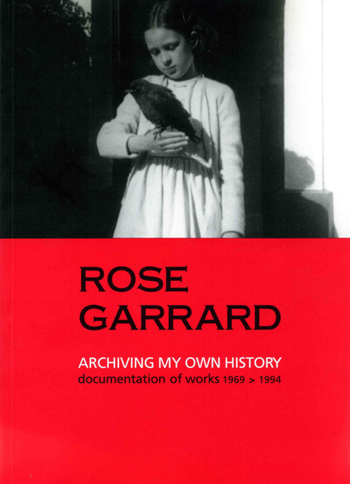“ARCHIVING MY OWN HISTORY” 1994

Rose was offered a retrospective exhibition at Manchester Cornerhouse Gallery, just before her motorbike accident in 1988. But soon after her treatment at St Bartholomew’s Hospital had finished and her main physical injuries had healed, Rose began to realise that she was experiencing considerable problems with her memory as a result of her concussion, particularly when delivering lectures or attending exhibition private views. As an aid to word finding and sequencing her thoughts, she began learning to work on a computer. Initial help with practical memory techniques was given by Homerton Hospital but with an increasing level of fear of accidents, Rose now found difficulty in travelling, so she also set about learning to drive. Although she had previously loved the solitude of her warehouse studio, Rose also found she was unable to overcome her fears of injuring herself when working there alone, so in the early 1990’s she accepted two offers of artist’s residencies in Canadian galleries, where she decided to work live with the public on “Calgary Conversation” and “Disclosing Dialogues”. After her return to England she was then diagnosed with Post-traumatic Stress Disorder and referred to a Harley Street specialist. During many months of counselling he recommended that she should stop all Art School teaching and have a studio in her home, moving out of London to reduce her stress levels. Rose stopped lecturing in Art Colleges and Universities in 1992.
Throughout this difficult time Beverly Bytheway from the Cornerhouse Gallery had gently but persistently kept in touch with her about the possibility of a major retrospective exhibition and by 1993 began helping Rose to compile “Archiving My Own History”, this comprehensive catalogue of her gallery work from 1969 onwards. Aware of the tradition of bias present when compiling 'his-stories', Rose conceived the form of her catalogue as a counter-balance to this by recording multiple views of her work taken from the popular press, the art press and her own notes, so that the reader can decide their own point of view. This considerable task couldn’t have been achieved without the patience and perseverance of both Beverly and Nicola Percy, a young artist brought in to assist Rose in recalling her experiences and organising her documentation.
With other women assistants helping Rose to clean and prepare the work in her studio, the successful retrospective exhibition “Living Archives” took place in March and April 1994. Throughout the three weeks of the show Rose worked daily with the public as part of her live installation “Exchanges for Empowerment”, the third of her ‘conversation pieces’. Rose continued with the exhibition tour to the Cadvat Gallery in Colchester and the Mead Art Gallery, Warwick, and with the fourth and final live work in the ‘conversation’ series, “Arena for Conversation” at the South London Gallery. At the end of the tour in September all the work was returned to Rose’s London studio packed away in wooden crates. To achieve the entire project financial support was gratefully received from the Henry Moore Foundation, the British Film Institute, the Arts Council of Great Britain, the North West Arts Board and the Association of Greater Manchester Authorities.
In 1995 Rose moved the contents of her studio back to the Malvern Hills, her childhood home, and soon began work on several sculpture commissions, which provided her sole income, giving up her London flat in 2002 to live there full time.
CATALOGUE Available from Cornerhouse Gallery, 70 Oxford Street, Manchester M1 5NH, Tel 061 228 7621